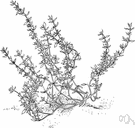thymus
(redirected from thymuses)Also found in: Thesaurus, Medical, Encyclopedia.
Related to thymuses: thymi
thy·mus
(thī′məs)n. pl. thy·mus·es
1. A small glandular organ that is situated behind the top of the breastbone, consisting mainly of lymphatic tissue and serving as the site of T cell differentiation. The thymus increases gradually in size and activity until puberty, after which it begins to atrophy.
2. A similar structure in other vertebrate animals.
[New Latin, from Greek thumos, warty excrescence, thymus.]
American Heritage® Dictionary of the English Language, Fifth Edition. Copyright © 2016 by Houghton Mifflin Harcourt Publishing Company. Published by Houghton Mifflin Harcourt Publishing Company. All rights reserved.
thymus
(ˈθaɪməs)n, pl -muses or -mi (-maɪ)
(Physiology) a glandular organ of vertebrates, consisting in man of two lobes situated below the thyroid. In early life it produces lymphocytes and is thought to influence certain immunological responses. It atrophies with age and is almost nonexistent in the adult
[C17: from New Latin, from Greek thumos sweetbread]
Collins English Dictionary – Complete and Unabridged, 12th Edition 2014 © HarperCollins Publishers 1991, 1994, 1998, 2000, 2003, 2006, 2007, 2009, 2011, 2014
thy•mus
(ˈθaɪ məs)n., pl. -mus•es, -mi (-mī).
a ductless, butterfly-shaped gland lying at the base of the neck, formed mostly of lymphatic tissue and aiding in the production of T cells of the immune system: after puberty, the lymphatic tissue gradually degenerates. Also called thy′mus gland`.
[1685–95; < New Latin < Greek thýmos]
Random House Kernerman Webster's College Dictionary, © 2010 K Dictionaries Ltd. Copyright 2005, 1997, 1991 by Random House, Inc. All rights reserved.
thy·mus
(thī′məs) An organ in vertebrate animals located behind the top of the sternum (breastbone) where lymphocytes called T cells develop. In humans, the thymus stops growing in early childhood and gradually shrinks in size through adulthood.
The American Heritage® Student Science Dictionary, Second Edition. Copyright © 2014 by Houghton Mifflin Harcourt Publishing Company. Published by Houghton Mifflin Harcourt Publishing Company. All rights reserved.
thymus
A lymphoid endocrine gland in the chest involved in immunity.
Dictionary of Unfamiliar Words by Diagram Group Copyright © 2008 by Diagram Visual Information Limited
ThesaurusAntonymsRelated WordsSynonymsLegend:
Switch to new thesaurus
| Noun | 1. |  Thymus - large genus of Old World mints: thyme Thymus - large genus of Old World mints: thymeasterid dicot genus - genus of more or less advanced dicotyledonous herbs and some trees and shrubs family Labiatae, family Lamiaceae, Labiatae, Lamiaceae, mint family - a large family of aromatic herbs and shrubs having flowers resembling the lips of a mouth and four-lobed ovaries yielding four one-seeded nutlets and including mint; thyme; sage; rosemary thyme - any of various mints of the genus Thymus |
| 2. | ductless gland, endocrine gland, endocrine - any of the glands of the endocrine system that secrete hormones directly into the bloodstream immune system - a system (including the thymus and bone marrow and lymphoid tissues) that protects the body from foreign substances and pathogenic organisms by producing the immune response |
Based on WordNet 3.0, Farlex clipart collection. © 2003-2012 Princeton University, Farlex Inc.
Translations
brzlík
kateenkorva
thymuszwezerik
grasica
brässthymus
Collins Spanish Dictionary - Complete and Unabridged 8th Edition 2005 © William Collins Sons & Co. Ltd. 1971, 1988 © HarperCollins Publishers 1992, 1993, 1996, 1997, 2000, 2003, 2005
thy·mus
n. timo, glándula situada en la parte inferior del cuello y anterosuperior de la cavidad torácica que desempeña un papel de importancia en la función inmunológica.
English-Spanish Medical Dictionary © Farlex 2012
thymus
n (pl -mi o -muses) timoEnglish-Spanish/Spanish-English Medical Dictionary Copyright © 2006 by The McGraw-Hill Companies, Inc. All rights reserved.